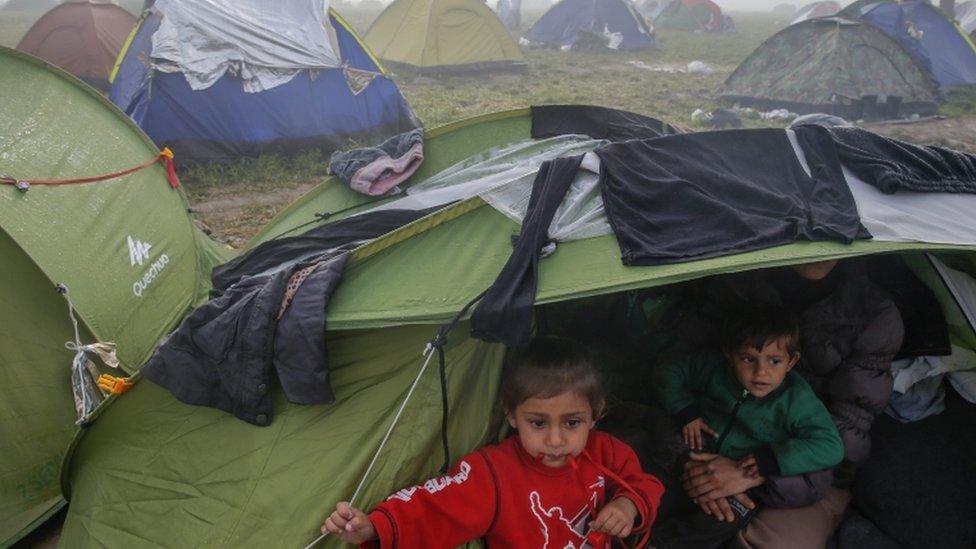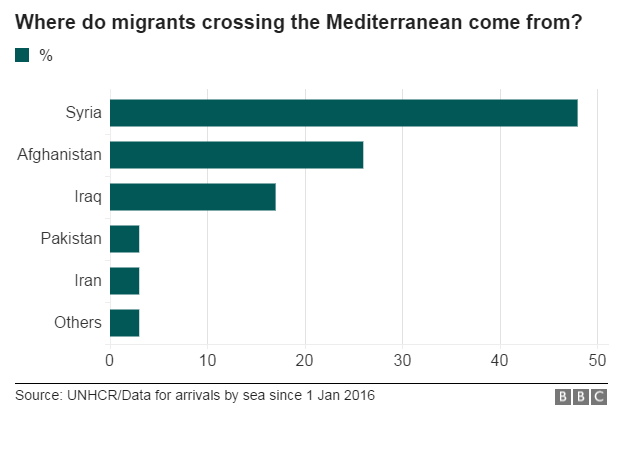Migrant crisis: UN legal concerns over EU-Turkey plan
- Published
The BBC's Ian Pannell: "For many the fear of staying behind outweighs the fear of the journey they must take"
The UN has expressed concern over a radical EU-Turkey plan to ease the migrant crisis, saying it could contravene international law.
Under the plan, external, all migrants arriving in Greece from Turkey would be returned and for each Syrian sent back, a Syrian in Turkey would be resettled in the EU.
The UN's refugee agency said any collective expulsion of foreigners was "not consistent with European law".
Amnesty International called the plan a death blow to the right to seek asylum.
The deal, discussed at a summit in Brussels on Monday, has not been finalised and talks will continue ahead of an EU meeting on 17-18 March.
Europe is facing its biggest refugee crisis since World War Two. Last year, more than a million people entered the EU illegally by boat, mainly going from Turkey to Greece.
Nearly half of them were Syrian, fleeing the country's civil war. Another 2.7 million Syrian refugees are currently in Turkey.

Read more about the migrant crisis

Meanwhile Slovenia has announced new restrictions for migrants - only those seeking asylum in the country or arriving for humanitarian reasons will be allowed entry.
The move means the Balkans route from Greece to Western Europe is "shutting down" to migrants, Slovenian Prime Minister Miro Cerar said.
In response Serbia, though which migrants transit on the way north to Slovenia and beyond, announced its own restrictions for migrants arriving at its borders.
The future of the Schengen agreement - which allows passport-free travel in a 26-nation zone - is already in doubt, given that eight of its members have introduced temporary border controls.
BBC correspondents describe the scene at pressure points of the crisis
What's in the EU-Turkey proposal?
The EU heads said "bold moves" were needed, and made the following proposals:
All new irregular migrants crossing from Turkey to Greece will be returned to Turkey. Irregular migrants, external means all those outside normal transit procedures, ie without documentation.
In exchange for every returned Syrian, one Syrian from Turkey will be resettled in the EU
Plans to ease access to the EU for Turkish citizens will be speeded up, with a view to allowing visa-free travel by June
EU payment of €3bn ($3.3bn; £2.2bn) promised in October will be speeded up, with the possibility of further aid to help Turkey deal with the crisis. Turkey reportedly asked for the sum to be doubled
Preparations will be made for opening new chapters in talks on EU membership for Turkey

How have leaders reacted to the deal?
European Council President Donald Tusk insisted the leaders at the summit had made a "breakthrough", and he was hopeful of concluding the deal in the next week.
However, German Chancellor Angela Merkel was more circumspect, saying: "It is a breakthrough if it becomes reality."
Turkish Prime Minister Ahmet Davutoglu said Turkey had taken a "game-changing" decision "to discourage illegal migration".

What will happen to the thousands of migrants already in Greece?
What are the legal concerns?
Vincent Cochetel, the UN's regional co-ordinator for the refugee crisis in Europe, said: "An agreement that would be tantamount to a blanket return of any foreigners to a third country is not consistent with European law."
Amnesty International said the plan was "wrought with moral and legal flaws".
Amnesty's Iverna McGowan said: "EU and Turkish leaders have sunk to a new low, effectively horse-trading away the rights and dignity of some of the world's most vulnerable people."
The EU believes the legal questions will be covered by declaring Turkey a "safe third country" for return. Amnesty says it strongly questions the whole concept of "safe third country".
Turkey is also not a full member of the Geneva Convention, which could raise more legal questions.

Can the return system work?
The system spelled out to the BBC by EU Commission spokesperson for migration Natasha Bertaud would see all migrants rescued in Greek waters taken to a Greek island for screening.
Irregular migrants would then be returned to Turkey to be screened again and "if they have no right to international protection" - which currently covers only Syrians - sent back to their country of origin.
All migrants rescued in Turkish waters would be taken back to Turkey, which would decide their status.
Serious questions remain. What will happen to the thousands of migrants already in Greece, which has struggled to shelter and register them?
The biggest problem will be the migrants themselves - having risked their lives and invested much of their money, will they not simply try other routes?
Vincent Cochetel said: "As long as the conflict is not solved, it's a myth to believe that people will not try to leave."
What are the other obstacles?
There is major opposition among some EU members to compulsory migrant quotas. Hungary says it vetoed the Turkish resettlement proposal on Monday and may do so again at the next EU meeting.
Turkey's bid for EU membership is another thorny issue, not helped by the recent wrangle over the court-ordered seizure of the opposition Zaman newspaper.
More problematic is Turkey's request for visa-free access for all its citizens to the EU's Schengen zone, which it hopes to achieve by June. This may draw a lot of opposition.
A note on terminology: The BBC uses the term migrant to refer to all people on the move who have yet to complete the legal process of claiming asylum. This group includes people fleeing war-torn countries such as Syria, who are likely to be granted refugee status, as well as people who are seeking jobs and better lives, who governments are likely to rule are economic migrants.